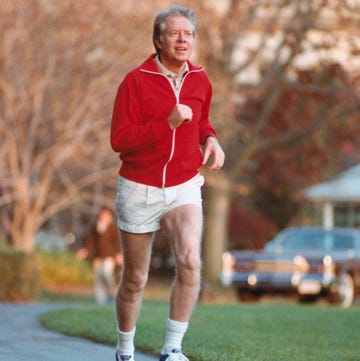On her way off the Olympic Stadium track on Monday in Rio de Janeiro,Emma Coburn carried her spikes in one hand and an American flag in the other. She had just placed third and won America’s first-ever Olympic medal in the women’s 3,000-meter steeplechase, but as she hugged her two U.S. teammates, her first words were not about her history-making performance.
“How did you do?” she asked.
DAA Industry Opt Outth.
“Oh my god, you guys are studs,” Coburn said. “Such studs.”
Quigley and Frerichs helped wipe away the remnants of joyful tears that had streamed down Coburn's face during the victory lap before she turned toward the reporters gathered before her. By finishing in 9:07.63, she had also broken her own American record by three seconds.
The race had started unexpectedly slow, and Coburn wasn’t afraid to take control in the first kilometer. She said she was happy to have Ruth Jebet surge into the lead shortly after that, however. It’s Simpson, her other teammates at home like in 8:59.75 while Coburn remained in the fourth-place position until two laps to go.
“I knew if I just steadily [increased] my pace I could get them,” she said.
She almost closed well enough for second, but Hyvin Jepkemoi, of Kenya, went through the final water jump slightly better than Coburn and held her off to take the silver. When Coburn crossed the finish line, she didn’t immediately realize she had broken the national record—it was never a goal for this race, she said. On Monday, her sole focus was landing on the podium and earning a medal.
“Every lap, in every race, I’m looking at the clock and paying attention to what my splits are. I’m very regimented that way, but with two laps to go the clock didn’t matter, I was just running as hard as I could,” she said. “I looked up at the jumbotron and saw 9:07? Is that right? And my jaw dropped. I didn’t know we were running that fast.”
At the Olympics, Coburn said she’s been focused primarily on controlling the aspects of preparation and racing that she can, which included her sleeping arrangements on Sunday night. She’d been sharing an apartment in Rio withJenny Simpson, her Boulder, Colorado-based teammate competing in the 1500 meters. When she couldn’t get the temperature just right in their place, Coburn took off to a hotel.
“My air conditioning wasn’t making me as frigid as I wanted so I was fussing with that…I was wanting to not have any other factors to blame besides myself if I didn’t do well,” she said. “So, poor Jenny. I was moving in and moving out and popping out.”
It’s Simpson, her other teammates at home like Kara Goucher, her family, coaches Mark Wetmore and Heather Burroughs, and her boyfriend of eight years, Joe Bosshard, who Coburn credits with her success. She also said the United States Olympic Committee and USA Track & Field medical staffs have helped her overcome the “dark days” dealing with a persistent Achilles injury over the past year.
“[On the victory lap] by the time I got around to my family, I somehow managed to climb into the stands and give them all hugs. I saw my boyfriend, Joe,” she said. “I’m just so happy I get to share this moment with all of them.”
This is only the third time that the women’s 3,000-meter steeplechase has been contested at the Games. The U.S. has had a swell of up-and-coming talent in the event and many have credited Simpson, who once held the American record, and Coburn with inspiring more women to compete in it.
CA Notice at Collection.
“I’ve looked up to her since I was a freshman and first learned the steeplechase,” she said. “My coach was like, ‘Look at videos of Emma Coburn. She’s the one you need to aspire to be like.’”
Quigley said she had to stop on the stairs as she was leaving the track to watch Coburn take to her victory lap, with the American flag over her shoulders. It was a surreal moment, given that nobody else in the country has ever achieved that level of success until Monday.
“I know it was a goal for her and it was definitely in the realm of possibility, but it seems like there are so many things that could happen in this race and we’re still trying to get there,” Quigley said. “And now we’re there.”















